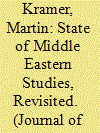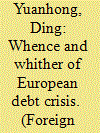|
|
|
Sort Order |
|
|
|
Items / Page
|
|
|
|
|
|
|
| Srl | Item |
| 1 |
ID:
113993


|
|
|
|
|
| Publication |
2012.
|
| Summary/Abstract |
The language may be deceptively conciliatory but the meaning of the BDS message is of intransigence. The rhetoric of this movement conceals a programme of 'resistance', a call to destabilize the status quo through unremitting public agitation over a long period. It rejects the premises of the Oslo agreements including the possibility of a negotiated peace with Israel or any form of reconciliation, and its message combines anti-Semitism with anti-Zionism. The movement is all the more dangerous because under the guise of a quest for justice its advocates skilfully conceal the strategic objective of isolating and destroying the Jewish state and perhaps also Jews who individually and collectively identify with the State of Israel.
|
|
|
|
|
|
|
|
|
|
|
|
|
|
|
|
| 2 |
ID:
126940


|
|
|
|
|
| Publication |
2012.
|
| Summary/Abstract |
The issue of anti-normalization has been attracting the attention of a growing number of Palestine activists. In recent months, several joint Israeli and Palestine activities have been targeted and disrupted by “anti-normalization” protesters. The issue has provoked concern among Israeli NGOs and international donors alike- the former being involved in a range of joint Israel-Palestine activities, and the latter funding those activities. The positions of Palestine NGOs are mixed. While some groups engage with Israelis in a tacit and low-profile manner, others have ended their involvement in joint activities altogether, regardless of the nature and purpose of the joint effort. Other Palestinian activists welcome joint nonviolent resistance to the occupation as in the cases of the solidarity campaigns in Sheikh Jarrah, Budrus, Ni'Lin, Bil'in, Nabi Saleh, Kufer Qadem and more. It should be also noted that there is a general exhaustion on the Palestine side, which has nothing to do with attitudes toward Israeli-Palestine dialogue and joint activity. The general sentiment among Palestine is that they should direct their energy toward developing Palestine institution and society and achieve a certain level of equality on all level before engaging with Israelis.
|
|
|
|
|
|
|
|
|
|
|
|
|
|
|
|
| 3 |
ID:
148605


|
|
|
|
|
| Summary/Abstract |
This retrospective assessment argues that despite the arrival in office in 2009 of a president who articulated the case for Palestinian rights more strongly and eloquently than any of his predecessors, U.S. official policy in the Obama years skewed heavily in favor of Israel. While a negotiated two-state resolution of the conflict between Israel and the Palestinians continued to be the formal goal of the United States, Israel's defiant refusal to stop settlement expansion, the administration's determined actions to perpetuate Israeli impunity in international fora, as well as the U.S. taxpayer's hefty subsidy of the Israeli military machine all ensured that no progress could be made on that score. The author predicts that with all hopes of a negotiated two-state solution now shattered, Obama's successor will have to contend with an entirely new paradigm, thanks in no small part to the gathering momentum of the Boycott, Divestment and Sanctions (BDS) movement.
|
|
|
|
|
|
|
|
|
|
|
|
|
|
|
|
| 4 |
ID:
191890


|
|
|
|
|
| Summary/Abstract |
This keynote address to the 2022 Association for the Study of the Middle East and Africa (ASMEA) conference assesses the health of Middle Eastern studies in the United States, according to three parameters first defined by ASMEA co-founder Bernard Lewis in 1979: standards, politicization, funding. In all three areas, the field remains plagued by endemic problems.
|
|
|
|
|
|
|
|
|
|
|
|
|
|
|
|
| 5 |
ID:
111557


|
|
|
|
|
| Publication |
2011.
|
| Summary/Abstract |
All major developed economies vary in the causes of their debt problems, but the nature is the same: income falling short of expenditure and spending on deficits. The root cause of European debt crisis lies mainly in the "high salary, high welfare" policy universally pursued in the European countries after WWII. The outbreak of global financial crisis became the fuse to the European debt crisis. The economic scales of Greek, Ireland and Portugal troubled by debt problems are not very large. Their debt problems constitute not much risk to the EU. But the European debt crisis has been turned into a hubbub. This is not only because the defects of the EU policy-decision mechanism have provided the public with an opportunity to play up the problem, but also because the US attempts, by speaking ill of the Euro, to resist the pressure from the European side demanding reform of the world financial system dominated by the US dollar. As a matter of fact, the US economic situation is no better than Europe's. Its debt burdens are also heavier than Europe's. Therefore, although European economic recovery will take a considerably long period, the Euro will not "collapse" and the Euro zone will continue to exist. The EU will remain the largest economy in the world.
|
|
|
|
|
|
|
|
|
|
|
|
|
|
|
|
|
|
|
|
|